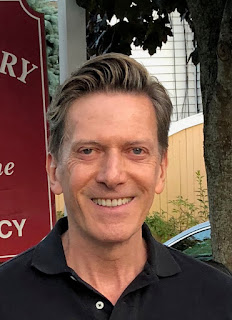Rehearsing While Writing: A Word from our Playwright
This October, TURN TO FLESH PRODUCTIONS celebrates our five year anniversary with an ambitious project, presenting four plays by foundress Emily C. A. Snyder: The Other, Other Woman in rhyming couplets, and a staged reading of the entire LOVE AND DEATH TRILOGY: Persephone Rises, The Seduction of Adonis and Cupid and Psyche. (Read more at BroadwayWorld.)
We wanted to know what was going on through our playwright's mind as she tackled writing an entirely new play while rehearsing it, simulating Shakespearean conditions. Here's what she has to say!
TICKETS: The Other, Other Woman (Oct. 4, 5, 11, 12 @ 8 PM)
TICKETS: The Other, Other Woman (Oct. 4, 5, 11, 12 @ 8 PM)
The Love and Death Trilogy (Oct. 6 & 13 @ 12, 4 & 8 PM)
A few years ago, some coveted original First Folios of Shakespeare's works were displayed at the Boston Public Library. Being a devotee of the Bard, naturally I went to the exhibit, thrilling as I saw the book opened up to Much Ado About Nothing, and the famous typo that credits the real life actor and clown, "Kempe" as the speaker of a line, rather than printing his character's name "Dogberry."
It was a slip of Shakespeare's pen that scholars have treasured ever since: to know exactly which clown played Dogberry. To know that Shakespeare was thinking of the actor himself, and wrote the part for him. Suddenly, these 400 year old words come vividly to life: a real acting troupe, just like the ones who put on shows every day of the year across this globe.
Ever since I was 13, I've been a working playwright.Which is to say, I was writing plays for specific acting troupes to perform. Tailoring the work to whatever the limitations of production were: 14 women and only 1 man in the company? No problem. I can write you that. A Wizard of Oz with no access to a trapdoor in order to melt our witch? No problem. Here's a joke where the janitor sweeps her off. I can write you that. A show for only twenty minutes? Three hours? One intermission? Two? None at all? No problem. I can write you that.
Working under practical limitations helps you as a playwright to get out of your own head and become incredibly collaborative. Directing my own shows has also always been the way that I can take a step back from the trees to see the proverbial forest. The opportunity to collaborate with actors who will come up with better jokes than myself, who learn more about my characters than I could ever inhabit (no matter how I enact every role, declaiming loudly in my home much to the consternation of the squirrels that pass my window)...
The rehearsal process has always been invaluable to the creation of every show.
However, every script I've ever turned in, I've always finished a complete draft at least by the first rehearsal. As much as I feel like I identify with that glover's son from Stratford-upon-Avon, I've always had the luxury of strolling into read-through with a completed draft. Never have I started with something half-realized and then fully developed by the company of actors. With The Other, Other Woman, I have. And this is what it was like:
- There's a thrill to leaving rehearsal with a "to list" of scenes and soliloquies that have to be written because my actors have requested a different direction for a scene or for their character.
- It's humbling to write against a deadline. I feel bad for poor Will who didn't have the luxury of a laptop and public transportation to get in a few extra lines before rehearsal! Likewise, send love to those folks who wrote out the sides for Shakespeare's troupe, and bless the smartphone for allowing daily scripts to be sent to the talented and patient cast!
- Because we needed a larger cast, since we're doing this show in rep with The Love and Death Trilogy, four of the actors basically invented their characters during initial worldbuilding games. It's a little like communally finishing the hat. And it's really exciting - it's like being eight years old and playing pretend again - as they run up to you and tell you how their story ought to end. Then you go back home, or stay up late, or write on the bus to give them words for their happily ever after.
- You know when you've collaborated with an actor on your original material for a while when they can tell you, as Abby Wilde and Keith Caram have been telling me, when I get an important scene massively wrong. In those cases, I ask the actors to just improvise. To say whatever the truth is. And then I stay up late and clean it up. It's a mark of how well you all know each other when Abby Wilde just improvises a brilliant soliloquy that sounds exactly like something you'd write, and you're just racing to write it down. Makes you wonder whether Burbage wrote any of his own material, doesn't it?
It's exciting, and I can't wait to share it with you.



Comments
Post a Comment